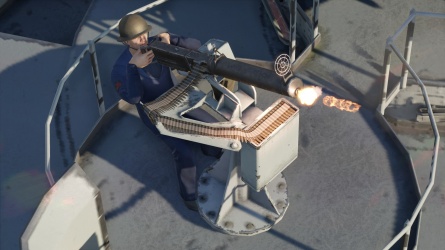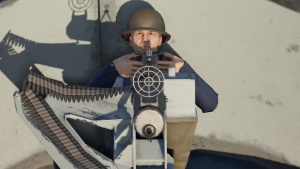Browning (13.2 mm)

Contents
Description
The 13.2 mm Browning was a US-designed Browning machine gun adopted by the French navy during the modernisations of their vessels in the 1940s.
The gun has a very large magazine and a very high rate of fire, though, as it was only used as a tertiary anti-aircraft gun, it is impossible to see details such as the bullet types or their characteristics.
Vehicles equipped with this weapon
General info
Tell us about the tactical and technical characteristics of the cannon or machine gun.
Available ammunition
Describe the shells that are available for the weapon and their features and purpose. If it concerns autocannons or machine guns, write about different ammo belts and what is inside (which types of shells).
Comparison with analogues
Give a comparative description of cannons/machine guns that have firepower equal to this weapon.
Usage in battles
Describe the cannon/machine gun in the game - its distinctive features, tactics of usage against notable opponents. Please don't write a "guide" - do not impose a single point of view, but give the reader food for thought.
Pros and cons
Summarise and briefly evaluate the weaponry in terms of its characteristics and combat effectiveness. Mark pros and cons as a list.
Pros:
Cons:
History
13.2 mm was an unusual calibre for Browning machine guns, as the majority of them used either 7.62 mm or 12.7 mm (.50 BMG). They were adopted by the French navy, particularly during the modernisations in the 1940s with the aid of the Allies. The gun itself had a mass of 31 kg on a 178 kg naval single-mount, which was designated CAS - Contre-Avions Simple, or Anti-aircraft single in English, often leading this gun to be called the 13.2mm Browning CAS. The mount allowed it to reach +79°/-10° vertical firing angles. Either AP or HE Tracer 13.2 x 135 mm bullets were used, with a muzzle velocity of 800 m/s and an effective maximum range of up to 2,000 m. The thick barrel of the gun, quite different from other Browning machine guns, resulted from the use of water cooling, cycling 9 litres of water to sustain a rate of fire of up to 650 rounds per minute.
Media
Excellent additions to the article would be video guides, screenshots from the game, and photos.
See also
- 13.2 mm Hotchkiss Model 1929 (domestic French equivalent)
External links
- French Destroyers: Torpilleurs D'escadre and Contre-Torpilleurs, 1922-1956 by John Jordan and Jean Moulin (Chapter 9 > Main Armament > Light AA Guns and Anti-Aircraft Weapons)
| Naval machine guns | |
|---|---|
| USA | |
| 7.62 mm | M73 |
| 12.7 mm | AN-M2 |
| Germany | |
| 7.62 mm | MG-3 |
| 7.92 mm | MG08 pattern 1908 · MG15 · MG34 |
| 13.2 mm | Hotchkiss |
| 15 mm | MG M38(t) |
| USSR | |
| 7.62 mm | Maxim |
| 12.7 mm | DShK |
| 14.5 mm | KPV |
| Britain | |
| 7.62 mm | FN MAG |
| 7.7 mm | Lewis 1916 · Vickers GO No.5 |
| 12.7 mm | Vickers Mk.V |
| Japan | |
| 6.5 mm | Maxim · Type 38 pattern 1907 |
| 7.7 mm | Type 89 · Type 92 |
| 13.2 mm | Type 93 |
| Italy | |
| 6.5 mm | Breda Mod.30 · Fiat Model 26 |
| 12.7 mm | Breda-SAFAT |
| 13.2 mm | Breda Model 31 |
| France | |
| 7.7 mm | Darne M1922 |
| 7.92 mm | Hotchkiss pattern 1914 |
| 13.2 mm | Browning · Model 1929 Hotchkiss |




